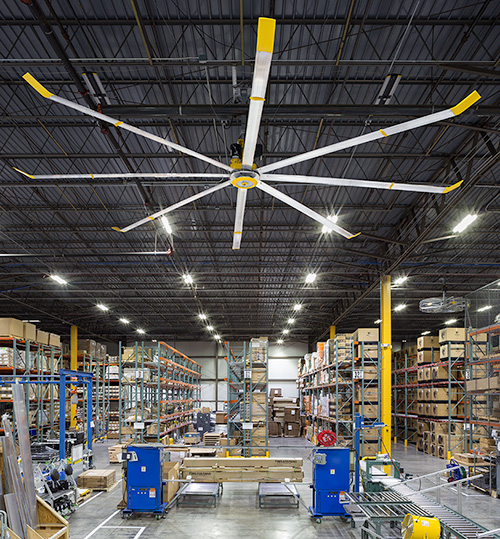Reduce Cooling Costs with HVLS Fans
Better air flow and a comfortable working environment

It’s summer, and it’s hot. No doubt, if you have an air-conditioned facility, your electric bills are headed someplace north of the top of the Eiffel Tower. HVLS (high volume, low speed) ceiling-mounted fans can reduce climate control costs, in particular when your facility is already air-conditioned.
- Under moderate heat conditions the fans can be run without the air-conditioning, slashing operating costs on the order of 90% (vs. air conditioning) while producing a pleasant open-air environment. This makes them excellent for early summer (like right now in many parts of the country), spring, late summer, and early fall. For areas that see this kind of weather frequently, where static air is unpleasant and air conditioning might be overkill, these ceiling mounted fans are absolutely perfect.
- On hot days, the fans let you set your air-conditioning thermostat set 10-15 degrees higher and get the same cooling effect. This amounts to big savings on air conditioning bills as we reach the height of summer. This works great in the evenings of multi-shift operations as well.
- Due to better air mixing, HVLS fans reduce the amount of cool air that has to be continuously replaced with hot outside air to achieve adequate ventilation.
- In a system designed around fans, cool air distribution costs will be reduced up to 75%.
- In new construction, the cost of the fans may be completely offset by the elimination of expensive ducting and the reduction in air-conditioning capacity.
Other Links:
Tags: heat stress, heat exhaustion, industrial fans, cooling, fans
Scott Stone is Cisco-Eagle's Vice President of Marketing with 35 years of experience in material handling, warehousing and industrial operations. His work is published in multiple industry journals an websites on a variety of warehousing topics. He writes about automation, warehousing, safety, manufacturing and other areas of concern for industrial operations and those who operate them.




